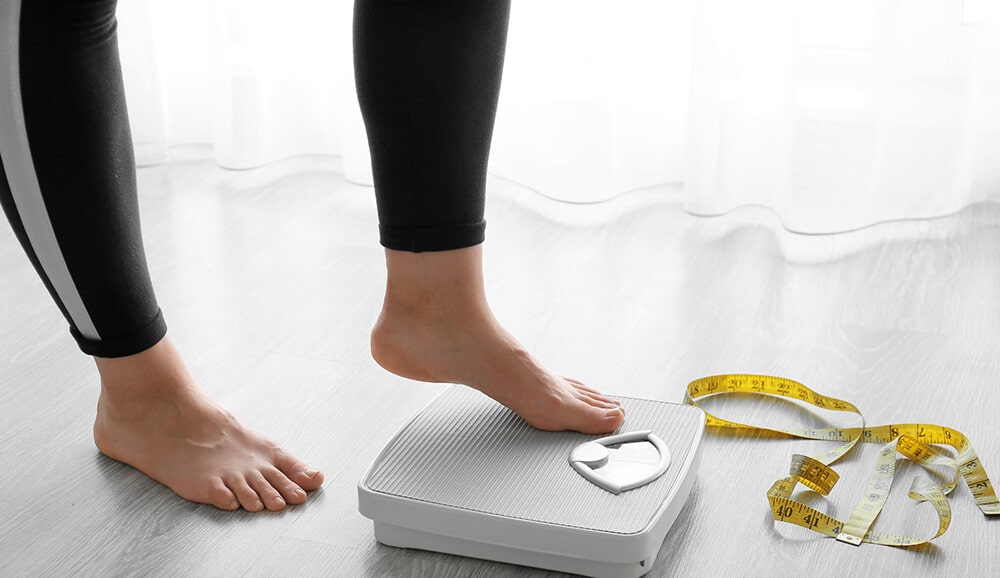Can Omega-3 Fish Oil Help You Lose Weight?
Over the years, I’ve often heard people say, “I’m not sure about taking a fish oil supplement…won’t omega-3 fatty acids make me fat?”
Unfortunately, the notion that all fat is bad persists. But today, it’s been well proven that it’s which types of fat you eat, not all fat in general, that makes the difference.
So does fish oil help you lose weight? Or does it make you gain weight? Let’s find out. We’ll take a closer look at why omega-3 fatty acids in fish oil play important roles in regulating our metabolism and may also influence our weight.
The Connection Between Omega-3s & Weight Management
In the United States today, one in five people struggle with obesity. Obesity is defined as having abnormal fat accumulation that poses health risks.
Obesity is a complex, multi-factorial issues. In other words, there are many causes for it, and it doesn’t have a simple solution. But one identified risk factor for obesity is having a high omega-6 to omega-3 ratio.
If that sounds complex, bear with me. It’s more intuitive than you might think.
Team omega-6 vs omega-3: Omega-6s and omega-3s compete against each other in the body. Too much omega-6 drives inflammation, while omega-3s have anti-inflammatory effects.
How the Omega-6: Omega-3 Ratio Influences Weight Gain
Omega-6 represents a family of fats. Typically, you’ll find lots of omega-6s in vegetable oils, like the corn and soybean oil that make many of our processed foods. Omega-6s saturate most of the foods you know aren’t great for your health, like cookies, chips, and fried foods.
Omega-3s, on the other hand, are largely lacking from the normal American diet. You mostly find omega-3s in things like fatty fish, flax and chia seeds, and certain types of nuts. Many people take fish oil supplements to increase their omega-3 intake.
Having a high omega-6 to omega-3 ratio means you’re consuming too much omega-6 and too little omega-3 from your diet. And today, having an out-of-whack ratio has become the norm. Our ancient hunter-gatherer ancestors had an omega-6 to omega-3 ratio that was 1:1 (meaning they were getting about the same amount of omega-6s and omega-3s). But for people eating an average American diet, that ratio is more like 20:1.
This skewed ratio affects weight gain, among other problems. In studies, researchers have shown that when mice were fed a diet high in omega-6s, it resulted in a progressive accumulation of body fat.
Notably, the researchers also found that when the mice were given high omega-6s during pregnancy and thereafter, the weight gain increased across generations. That trend mirrors what we’re seeing in humans, with obesity only getting worse over the decades and emerging earlier and earlier in life.
Having a high omega-6 to omega-3 ratio causes other issues too. Omega-6s are generally speaking pro-inflammatory. So, when you eat too many of these fats, it drives chronic low-grade inflammation. As we’ll discuss more in depth below, chronic inflammation both contributes to the progression of obesity – and is one of the major consequences of it as well.
How Omega-3s Influence Metabolic Health
With obesity, researchers are especially focused on central white fat that accumulates deep within the abdominal cavity. This central white fat surrounds vital organs such as the pancreas, intestines, liver, and heart. Its accumulation can lead to a state of chronic inflammation.
Why is chronic inflammation bad? Well, chronic inflammation is basically the reason why obesity is a health concern. Chronic inflammation leads to a host of problems, like heart disease, type 2 diabetes, cancer, and poor immune health.
In white fat, there are several kinds of biomarkers for inflammation, like TNF-alpha, interleukin-6, interleukin-18 and C-reactive protein (CRP). All of these biomarkers increase with weight gain and decrease with weight loss. High levels of these biomarkers are linked to health problems like insulin resistance and metabolic syndrome.
This kind of systemic inflammation is one of the major causes of insulin resistance. This means your body can’t utilize insulin, which is needed to move glucose or sugar into the cell for energy. This in turn produces more insulin. You can start off with having normal blood sugar levels, but eventually, these levels increase and you become pre-diabetic or diabetic.
Now this is where omega-3s come in. Remember how I said that omega-6s are pro-inflammatory? Well, omega-3s are just the opposite. This family of fats reduces inflammation by bringing those biomarkers of inflammation back in check. Take IL-6, as one example. One 2018 study found that a daily dose of 2500 mg of omega-3s reduced IL-6 levels by 22% in just 8 weeks.

How can you get enough omega-3s? In the average American diet, people get 20 times more omega-6s than omega-3s. To correct the imbalance, most people need to regularly eat fatty fish and taken an omega-3 supplement.
Studies on Omega-3s & Weight Loss
There’s no question that omega-3s are beneficial for combatting the chronic inflammation associated with obesity. But can eating more omega-3s or taking an omega-3 supplement actually help you obtain a healthy body weight?
Here, the jury is still out. A number of animal studies, and some trials with people, have found that fish oil supplementation may protect against obesity and potentially reduce or prevent further weight gain in already obese animals. Some studies have also indicated that omega-3s can support a better body composition and make people feel fuller.
Still other studies of humans have found that omega-3 supplementation didn’t seem to have much of an impact on weight loss. Because of the variety in doses used, target groups, and other varying factors in studies, scientists don’t have enough data at this time to say if taking fish oil supplements high in omega-3s can aid weight loss specifically.
With that said, several trials have found that omega-3 supplementation as part of a weight loss diet may help dieters get better results. For example, in one study, men who were both on a calorie restricted diet and took supplemental fish oil lost about 2.2 pounds more than men who were not in the fish oil group. Another study similarly found that omega-3s improved abdominal fat mass in obese individuals who were also dieting.
Other Benefits of Omega-3s for Obesity
As anyone who has tried to diet knows, losing weight – and keeping it off long term – isn’t easy. And today, many people question if that narrow focus on the scale even makes sense. As such, some practitioners are now starting to move the focus to reducing the complications of obesity and improving quality of life.
On this front, omega-3s have a lot to offer. Let’s take a look at some of the key areas where omega-3s can make a big difference.
Improving Your Metabolic Profile
Many people who are obese often have an unhealthy metabolic profile. In other words, they often also have high blood pressure, high triglyceride levels, high levels of those inflammatory biomarkers noted above, and insulin resistance. All of these components put you at a greater risk for heart disease, type II diabetes, and many other diseases.
Importantly, not everyone who is obese has a bad metabolic profile. Some people who are classified as obese or overweight can have a healthy profile, which reduces their risk for disease.
Getting enough omega-3 fatty acids offers a natural way to improve your metabolic profile. It’s well accepted that fish oil supplementation can reduce triglyceride levels, if you take an effective daily dose. It’s also well accepted that omega-3s can improve blood pressure and the levels of inflammation in the body.
Obesity Requires Higher Doses
It’s vital to get enough omega-3 fatty acids to enjoy their benefits. Regular fish oil capsules don’t cut it.
For triglycerides and high blood pressure, studies show it takes consuming 3000 – 4000 mg of EPA/DHA omega-3s daily to significantly lower levels. For lowering inflammatory cytokines, at least 2000 mg of EPA/DHA daily are required. And since the daily dose of omega-3s is somewhat influenced by weight, researchers note that higher levels of omega-3s are likely needed for obese individuals.
So what do these doses look like if you want to take an omega-3 supplement? Regular fish oil capsules contain only 300 mg of EPA/DHA, which means you’d be swallowing a good 10 pills per day to get an effective daily dose.
Liquid omega-3 oil is a more effective choice. It is easier to swallow 1 tablespoon of liquid compared to 10 fish oil capsules.
Beyond being easier to swallow, liquid fish oil likely has a better effect on the gastrointestinal tract microbiome that’s heavily involved in fat metabolism and signaling hunger or satiation. Omega-3 oil is a powerful nutrient for the good bacteria we harbor in our mouth all the way through the colon. Using fish oil capsules instead of liquid reduces the area of contact and thus the potency of the oil.
Your perfect dose, simplified: Consuming just 1 vial of Omega Cure® Extra Strength per day provides 3000 mg of EPA/DHA in a single, drinkable serving.
Combining Omega-3 Fish Oil with a Healthy Diet
As noted above, omega-3s are not a weight loss panacea. But getting enough omega-3s is an important part of a balanced diet because it ensures that the body and our microbiome receive all the essential nutrients needed to function properly.
A balanced diet includes a variety of food groups, such as fruits, vegetables, whole grains, lean proteins, and healthy fats. When you consume a diet rich in these nutrients, it helps to control hunger and reduce cravings, making it easier to stick to a weight loss plan. Additionally, a balanced diet supports metabolic processes and helps maintain muscle mass, which is important because muscle burns more calories than fat, even at rest.
Ultimately, a balanced diet gives the best odds for longterm weight management success and overall well-being, making it a goal worth striving towards.
An Effective Omega-3 Dose, Made Simple
Experience the Omega3 Innovations difference for yourself with the most effective fish oil supplement on the market.
Buy Now
- https://pubmed.ncbi.nlm.nih.gov/26950145/
- https://www.ncbi.nlm.nih.gov/pmc/articles/PMC4808858/
- https://www.ncbi.nlm.nih.gov/pmc/articles/PMC7561009/
- https://pubmed.ncbi.nlm.nih.gov/35815739/
- https://pubmed.ncbi.nlm.nih.gov/34330455/
- https://www.ncbi.nlm.nih.gov/pmc/articles/PMC5946217/
- https://www.ncbi.nlm.nih.gov/pmc/articles/PMC5507106/
Popular posts



Related posts








